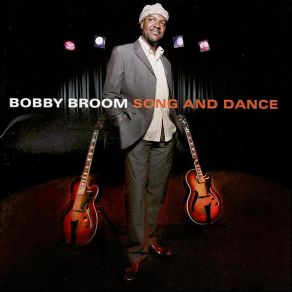Song and Dance
Download links and information about Song and Dance by Bobby Broom. This album was released in 2007 and it belongs to Jazz genres. It contains 10 tracks with total duration of 01:05:05 minutes.

|
|
|---|---|
| Artist: | Bobby Broom |
| Release date: | 2007 |
| Genre: | Jazz |
| Tracks: | 10 |
| Duration: | 01:05:05 |
| Buy it NOW at: | |
| Buy on iTunes $9.90 | |
| Buy on Amazon $8.99 | |
Tracks
[Edit]| No. | Title | Length |
|---|---|---|
| 1. | Can't Buy Me Love | 6:53 |
| 2. | Where Is the Love? | 6:22 |
| 3. | Little Rascals Theme (Good Old Days) | 5:41 |
| 4. | Coming Home | 6:41 |
| 5. | Blues for Modern Man | 5:08 |
| 6. | Superstar | 6:17 |
| 7. | Smile | 8:32 |
| 8. | Wichita Lineman | 7:31 |
| 9. | You and the Night and the Music | 5:43 |
| 10. | Waiting and Waiting | 6:17 |
Details
[Edit]Bobby Broom had recently turned 44 when he recorded Song and Dance in February and March 2005. In youth-obsessed markets like hip-hop, teen pop, or dance-pop, any artist who is 44 and successful probably became established 20 or 25 years earlier. But jazz is a different ball game. In jazz, age is a plus; it means more years developing your skills, improving your chops, and discovering who you are as an artist. Jazz is full of people who had more to say at 44 than they did at 24, and Broom has a lot to say on Song and Dance. This trio date finds the guitarist (who is joined by bassist Dennis Carroll and drummer Kobie Watkins) bringing his improvisational skills to a variety of material, which ranges from the Beatles' "Can't Buy Me Love" to Charlie Chaplin's "Smile" to "Where Is the Love?" (a major hit for Roberta Flack and Donny Hathaway in the early '70s). But whatever the song — whether he is playing original compositions or tackling "Good Old Days (The Little Rascals Theme)" — Broom always keeps things personal and maintains the perspective of a jazz instrumentalist. Another highlight of this 65-minute disc is Jimmy Webb's "Wichita Lineman," which was a number one country hit for Glen Campbell in 1968; Broom has no problem taking "Wichita Lineman" out of country-pop and making the tune a vehicle for post-bop improvisation. And why shouldn't Broom find the jazz potential in songs that were recorded by the Beatles, Flack, or Campbell? Contrary to what some of the more dogmatic individuals in the jazz world would have listeners believe, worthwhile popular music did not end with Tin Pan Alley. Broom, of course, realizes that, and his open-mindedness is a definite advantage on this memorable CD.